The IUGG Electronic Journal Volume 15 No. 8 (1 August 2015)
INTERNATIONAL UNION OF GEODESY AND GEOPHYSICS
UNION GEODESIQUE ET GEOPHYSIQUE INTERNATIONALE
The IUGG Electronic Journal
Volume 15 No. 8 (1 August 2015)
This informal newsletter is intended to keep IUGG Member National Committees informed about the activities of the IUGG Associations, and actions of the IUGG Secretariat. Past issues are posted
on the IUGG website (http://www.iugg.org/publications/ejournals/). Please forward this message to those who will benefit from the information. Your comments are welcome.
Contents
1. Editorial: 26th IUGG General Assembly
2. Report on the Congress of the World Meteorological Organization (WMO)
3. News from the International Council for Science (ICSU)
4. Awards and Honors
5. Meeting calendar
1. Editorial: 26th IUGG General Assembly
The 26th General Assembly of the International Union of Geodesy and Geophysics held from 22
June to 2 July 2015 in the beautiful city of Prague (Czech Republic) was a big success. The IUGG
Executive Committee thanks the Czech Academy of Sciences and its Institute of Geophysics for
hosting the event as well as the Prague Local Organizing Committee and C-IN professional
conference organizers for excellent management and hospitality provided to more than 4300
participants of the assembly.
The IUGG General Assembly consisted of three important parts: (i) an open Scientific Assembly,
(ii) a meeting of the duly accredited Delegates of the IUGG Member Countries and guests invited in
accordance with the By-Laws (referred to as the Council Meeting); and (iii) business meetings of
the IUGG, Union Associations, and their scientific groupings.
Scientific Assembly
The Scientific Program of the General Assembly consisted of 202 symposia and workshops and 639
sessions in total. Among more than 5300 presentations at the General Assembly were 9 Union
lectures, 476 invited presentations, 2682 oral presentations, and 2211 poster presentations.
The nine Union lectures delivered on 24, 26 and 29 June 2015 were:
- “Transformation of Human Society for Sustainable Future” by Yuan T. Lee (China-Taipei),
- “The Whole System Approach to Extreme Space Weather” by Janet U. Kozyra (USA),
- “Challenges of Educating Hydrologists for the Global South; the Case of southern Africa”
by Dominic Mazvimavi (South Africa),
- “Sea Level Change in the Anthropocene” by Jonathan Gregory (UK),
- “Earthquake Dynamics and Seismic Radiation” by Raul Madariaga (France), 2
- “Volcanic Ash and Aviation Safety” by Thomas J. Casadevall (USA),
- “Contributions of Geodesy to Monitoring Natural Hazards and Global Change” by Harald
Schuh (Germany),
- “Atmospheric Chemistry in the Anthropocene” by Laura Gallardo (Chile), and
- “The Global Ocean Carbon Sink: Recent Trends and Variability” by Nicolas Gruber
(Switzerland).
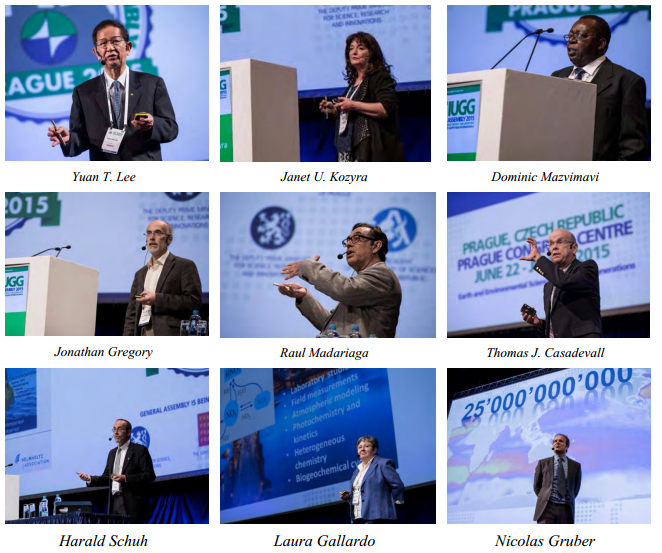
IUGG Council Meeting
Union’s affairs are directed by the Council governed by the IUGG Statutes and By-laws. The
Council is composed of one credentialed delegate from each Adhering Body. The Council meets
during IUGG General Assemblies. At the Council meeting, Delegates from 49 Adhering Bodies
attended three sessions of the Council Meeting. The IUGG Council considered and approved a
number of initiatives and activities. Namely,
• The Council ratified the admission of Saudi Arabia and Nicaragua as Regular National
Members; six international organizations as Affiliate Members; Albania, Armenia and Bosnia
& Herzegovina as Associate Members; and transfer of Costa Rica from Associate to Regular
membership.
• All proposed changes to the Statutes and By-Laws were approved by the Council.
• The IUGG Strategic Plan for 2016-2023 was endorsed. The Strategic Plan will be developed
further together with an implementation plan to be approved by the Council in the nearest
future.
• New IUGG and Association Officers were elected.
• Official IUGG Liaisons to various intergovernmental and international scientific bodies were
appointed.
• The budget for 2016-2019 was approved.
• Montréal, Canada, was selected as the venue for the 27th General Assembly of the Union in
2019.
• Eight resolutions were passed.
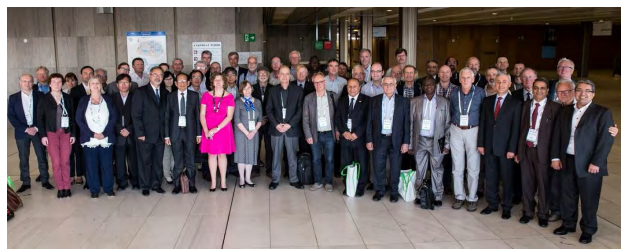
After the Council meeting on 29 June 2015, Prague, Czech Republic
The changes to the IUGG Statutes and ByLaws establish the Permanent Delegates to IUGG
Council. Namely, the Adhering Bodies of Member Counties shall appoint Delegates to Council for
the period between General Assemblies (earlier they were appointed only for the Council meeting),
so that the Council can vote electronically to make decisions as soon as the need arises. This will
make IUGG more vibrant in terms of decision making.
Scientists from any country are now eligible to hold various positions within the IUGG family with
the following exceptions: positions in the Bureau and the Finance Committee, and the positions of
Presidents of the Associations, which can only be held by scientists from Member Countries.
Details about these decisions will soon be available on the IUGG website.
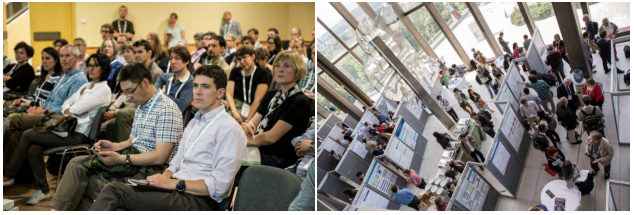
At oral and poster sessions
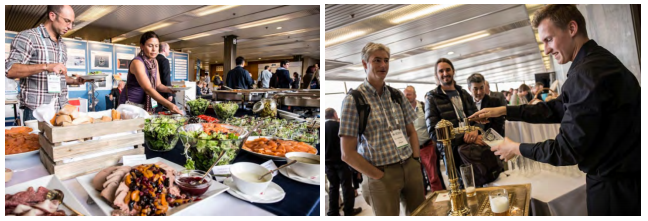
Delicious Czech meal and famous beer!
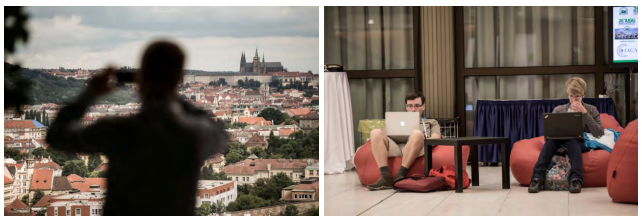
Between sessions (all photos: courtesy of IUGG & C-IN)
2. Report on the Congress of the World Meteorological Organization
The 17th Congress of the World Meteorological Organization (WMO) met in Geneva, Switzerland,
from 25 May to 12 June 2015. Many topics relevant to IUGG expertise have been discussed.
Good progress with the Global Framework for Climate Services (GFCS) was reported and it is now
accepted as an established part of WMO’s programme. One issue that arose during the discussion of
the GFCS was related to data exchange. Back in 1995 WMO adopted a resolution promoting the
free and open exchange of meteorological data. Four years later, a similar resolution on the
exchange of hydrological data was adopted. Neither of these resolutions makes specific reference to
climatological and related data. Much effort has been put into drafting a third resolution to fill this
gap. A resolution on the subject was eventually adopted after long (and difficult) negotiations. The
UN Secretary-General has called for proposals for a data revolution in support of sustainable
development. This is seen as referring to “big data”, namely crowd-sourced data, social media and
the like. The WMO Congress showed considerable interest in the subject and has asked its
Executive Council to look into the matter.
There was good support for the Global Cryosphere Watch (GCW) itself and it was interesting to see
Indonesia and Kenya stressing the importance to them of having their high-altitude stations
included in the GCW. However, there was obvious disagreement over how to fund the GCW
Project Office. Finally Congress “requested the Secretary-General to establish a GCW Project
Office to support all GCW activities, including coordination with partners, monitoring of its
implementation, reporting and follow-up actions and to provide support for the Office through a
combination of regular and matching extra-budgetary resources.”
The presentation of the World Climate Research Programme (WCRP) included a number of
references to their plans to strengthen their work in hydrology. When it was first established in the
1970s, one element of the World Climate Programme was the World Climate Impact Studies
Programme. For many years UNEP left this dormant but more recently they have sought to fill the
gap with their new initiative entitled the Global Programme of Research on Climate Change
Vulnerability, Impacts and Adaptation (PROVIA). It aims to act as an interface between the
research community, decision makers and other stakeholders to improve policy-relevant research
and its dissemination.
Guy Brasseur, Chair of the WCRP Joint Scientific Committee, presented the planned new WCRP
climate research efforts that aim to address the most pressing questions posed by society on climate
change: How much warmer will the planet be by the end of the century? How frequent and how
intense will extreme events (droughts, flooding etc...) be? How will water availability change under
a changed climate? How fast will sea levels rise in different parts of the world and how vulnerable
are coastal cities and their populations? How fast will the Arctic sea ice melt and how will it affect
other regions of the world? How can we improve our seasonal-to-decadal predictions? To respond
to these questions, the international WCRP community has identified six climate Grand Challenges
that will be the research foci for WCRP for the next 5-10 years: (i) Clouds, circulation and climate
sensitivity; (ii) Understanding and prediction of weather and climate extremes; (iii) Water
availability; (iv) Sea-level rise and regional impacts; (v) The Cryosphere in a changing climate; and
(vi) Decadal climate information and prediction. All the challenges fit a paradigm of global
processes with regional and local impact.
David Carlson, WCRP Director, placed particular emphasis on the successful international
collaboration for CMIP5 (Coupled Modeling Intercomparison Project phase 5) products and
processes. CMIP5 outcomes provided the fundamental modeling basis for the entire IPCC 5th
Assessment Report (AR5), permeated many chapters of the Working Group I report and continue to
enable a very wide range of climate research and analysis. WCRP’s planning efforts for phase 6 of
CMIP is well underway. The CMIP6 process is composed of a research-driven set of climate
diagnosis, evaluation and characterization experiments accompanied by standardization,
coordination, infrastructure, and documentation functions to allow all simulations and their main
characteristics performed under CMIP to be made available to a broader community. The WMO
Congress also expressed appreciation for WCRP’s continued, positive and effective relationships
with its co-sponsoring organizations, the Intergovernmental Oceanographic Commission (IOC) of
UNESCO and the International Council for Science (ICSU).
During the Congress, the topic of space weather was discussed. Jérome Lafeuille, the WMO staff
member in charge of the topic, pointed out that their four-year plan makes reference to IAGA as a
“scientific organization involved in particular aspects” of space weather. Jérome Lafeuille was keen
to emphasize that WMO is taking on an increasing operational role, whereas they see IAGA as a
source of scientific expertise.
The WMO Secretariat presented a budget for 2016-2019 which represented a 7.4% increase over
that for the current financial period. The difficult financial situation currently faced by many
countries, added to the recent rise in value of the Swiss Franc, made it difficult to find support for
the Secretariat’s proposals. Despite these circumstances, the Congress approved a budget which is
2% above the current level.
While it is not of great significance to our relations with WMO, it is important to note that David Grimes (Canada), Antonio Moura (Brazil), Mieczyslaw Ostojski (Poland) and Abdalah Mokssit (Morocco) were re-elected unopposed to the posts of President and First, Second and Third Vice-Presidents respectively. More important is the fact that Michel Jarraud (France) will come to the end of his 12 years as Secretary General of WMO at the end of 2015. He cannot be re-elected and so an election was held in which, on the final round of voting, Petteri Taalas (Finland) gained 75% of the vote and Elena Manaenkova (Russia) 25%. This was the first time that a woman had stood for election to the post. Michel Jarraud’s 12-years as Secretary General was the first for which a limited duration had been imposed by WMO. However, other UN agencies have long had limits as to how many years a Secretary General may serve. In view of this, Congress has now reduced the maximum duration for WMO from 12 to 8 years.
Finally IUGG has very good and broad ranging relations with WMO. These links stretch back to the 1950s as regards IAMAS and IAHS, those with IAVCEI, IACS, IAGA and IAPSO, being added recently.
Source: Arthur Askew (IUGG Principal Liaison Officer to WMO) and the ICSU webpage
3. News from the International Council for Science (ICSU)
Jenny Baeseman appointed SCAR Executive Director
Jenny Baeseman has been appointed as the Executive Director of the Scientific Committee on Antarctic Research (SCAR). She has been the Executive Director of the Climate and Cryosphere (CliC) project of the World Climate Research Program (WCRP) since 2012 and previous to that was the Founding Director of the Association of Polar Early Career Scientists (APECS). Jenny Baeseman chaired the IUGG Early Career Scientists Award Selection Committee for 2014-2015. IUGG congratulates Jenny Baeseman on her appointment and looks forward to further cooperation with SCAR!
New members of the Committee on Freedom and Responsibility in the conduct of Science announced
At its April session, the ICSU Executive Board approved the new members of the ICSU Committee
on Freedom and Responsibility in the conduct of Science (CFRS). The committee will continue to be chaired by Leiv K. Sydnes of the University of Bergen, Norway, and the new members will take office from 1 October 2015 to 30 September 2018. The Committee on Freedom and Responsibility in the conduct of Science (CFRS) serves as the guardian of the ICSU Principle of Universality of Science. Its mission is to raise international awareness for and promote freedom and responsibility aspects related to the conduct of science.
ICSU participates in key UN panels on science and the Sustainable Development Goals
The annual session of the High-Level Political Forum (HLPF), the deliberating body for sustainable development in the United Nations (UN), takes place from 26 June to 6 July at the UN headquarters in New York. The theme of this year's session is "Strengthening integration, implementation and review –the HLPF after 2015". ICSU and its programmes are represented in several panels of the event. On 29 June Lucilla Spini, Head of Science Programmes at ICSU, participated in a morning meeting with member states on the topic of “How science can inform policy making.” She urged governments and institutions to collaborate more closely with science organizations and pointed out the many
different ways in which ICSU fosters interdisciplinary collaboration through its research programmes. She highlighted the three main challenges that exist for interaction between science and policy: the fact that the two communities speak different languages (which makes the role of broker organizations important, both on the global and the national level); that the two communities work on different timescales – much shorter for the policy community; and the scarce opportunity for dialogue –leading to a need to create opportunities for that dialogue through ad hoc events or online fora.
New Scientific Committee and Chair appointed for ICSU World Data System
The ICSU Executive Board approved the new membership of the World Data System (WDS) Scientific Committee. The committee will be chaired by Sandy Harrison, Professor of Palaeoclimates and Biogeochemical Cycles, University of Reading, UK. Sandy takes over the role of Chair from Jean-Bernard Minster, Professor of Seismology, University of California at San Diego, whose term has been exceptionally extended for one additional face-to-face meeting to enable a formal handover of the leadership. In this regard, ICSU has introduced a stagger between the appointment of the SC Chair and members to ensure continuity.
Source: ICSU website
4. Awards and Honors
The IUGG President presented the Union awards to the Gold Medalist, six elected Fellows, and ten Early Career Scientists Awardees on 23 June at the Opening Ceremony, and to the conferred Fellows on 1 July at the Closing Ceremony of the 26th IUGG General Assembly, Prague, Czech Republic, 22 June – 2 July 2015.
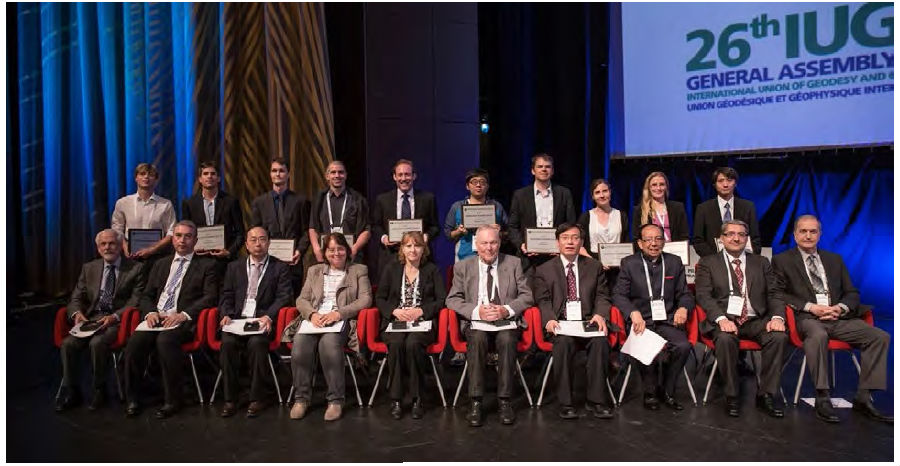
After the Award Ceremony. First row (from the left to the right) – the Gold Medalist Sir Brian J. Hoskins; IUGG Fellows: John Burrows, Xiaofei Chen, Andrea Flossmann, Sophie Godin-Beekmann, Gerald Jones, and Jianping Li; President Harsh Gupta, Secretary General Alik Ismail-Zadeh, Vice President Michael Sideris. Second row (from the left to the right) – Early Career Scientist Awardees Andreas Fichtner, Gregory Foltz, Markus Hrachowitz, Matthias Huss, Ben Kravitz, Ruiqiang
Ding, Ben Marzeion, Ilona Riipinen, Johanna Salminen, and Futoshi Takahashi.
Günter Blöschl(Vienna University of Technology, Austria, and IAHS President-elect 2015-2017) received the Robert E. Horton Medal, Gordon McBean (University of Western Ontario, Canada, and IUGG Fellow, Bureau Member 1987-1995) the Ambassador Award, and Anne Thompson (NASA Goddard Space Flight Center, USA, and IAMAS Vice President 2007-2011) the Roger Revelle Medal of the American Geophysical Union (AGU). Peter Fox (Rensselaer Polytechnic Institute, Troy, USA, Chair of the IUGG Union Commission on Data and Information) and Guoxiong Wu (Chinese Academy of Sciences, Beijing, China; and past President of IAMAS) was elected AGU Fellows. The award and medals will be presented at the 2015 AGU Fall Meeting in San Francisco.
Congratulations to all!
5. Meeting calendar
A calendar of meetings of interest to IUGG disciplines (especially those organized by IUGG Associations) is posted on the IUGG website (http://www.IUGG.org/calendar). Specific information about these meetings can be found there. Individual Associations also list more meetings on their websites according to their disciplines.
August
- 2-7, AOGS, Singapore, Singapore, AOGS 12th Annual Meeting. Web: http://www.asiaoceania.org/aogs2015
- 3-14, IAU, Honolulu, HI, USA, XXIX General Assembly of the International Astronomical Union. Web: http://astronomy2015.org
- 17-21, IGU, Moscow, Russia, Regional Conference of the International Geographical Union. Web: http://www.igu2015.ru/
- 23-28, ICA, Rio de Janeiro, Brazil, XXVII International Cartographic Conference and XVI General Assembly of the ICA. Web: http://www.icc2015.org
- 23-29, University of Innsbruck, Innsbruck, Austria, Innsbruck Summer School of Alpine Research on Surface-Atmosphere Exchange over Mountainous Terrain. Web: http://www.uibk.ac.at/congress/innsar/
September
- 7-11, SCOR, Kiel, Germany, SOLAS Open Science Conference. Web: https://www.confmanager.com/main.cfm?cid=2778
- 7-12, URSI, Oxford, UK, Metamaterials 2015 - The Ninth International Congress on Advanced Electromagnetic Materials in Microwaves and Optics. Web: http://congress2015.metamorphose-vi.org/
- 13-19, SCAR, Gibraltar Island, Lake Erie, USA, 2015 Glacial Isostatic Adjustment Training School. Web: http://polenet.org/?page_id=2261
- 15-17, IAHS, ESA, Frascati, Italy, Third Space for Hydrology Workshop. Surface Water Storage and Runoff: Modelling, In-Situ data and Remote Sensing. Web: http://www.hydrospace2015.org/
- 20-24, IUSS, Göttingen, Germany, 5th International Symposium on Soil Organic Matter. Web: www.som2015.org
- 21-23, ILP, Potsdam, Germany, 35 years of ILP. Celebrate Excellence in Solid Earth Sciences. http://www.scl-ilp.org/events/35-ilp/
- 23-26, IUSS, Kiel, Germany, International Congress on the occasion of the International Year of Soils 2015. Web: http://www.soils.uni-kiel.de/de/sustain-2015
9
- 28-30, SCOSTEP, WDS, Tokyo, Japan. Workshop on ‘Global Data Activities for the Study of Solar-Terrestrial Variability’. Web: http://isds.nict.go.jp/scostep-wds.2015.org/
- 28 September – 2 October, ISPRS, Montpellier - La Grande Motte, France, ISPRS Geospatial Week 2015. Web: http://www.isprs-geospatialweek2015.org/
October
- 5-9, ILP, Tokyo, Japan, 10th Workshop of the International Lithosphere Program. ILP Sedimentary Basin 2015 Tokyo. Web: http://www.scl-ilp.org/fileadmin/sclilp/events/ILP_SB_2015_Tokyo_First_C...
- 12-25, IAVCEI, Olot, Spain, 4th International Course on Volcanology (in Spanish). Web: http://www.gvb-csic.es/CURSO/CURSO_OLOT/Home.html
- 13-15, EAGE, Celle, Germany, 3rd EAGE Sustainable Earth Sciences Conference ‘Use of the Deep Sub-Surface to Serve the Energy Transition’. Web: http://www.eage.org/event/?eventid=1259
- 13-16, IAHS, GEO, UNESCO, WMO, Koblenz, Germany, International Conference “Water Resources Assessment & Seasonal Prediction”. Web: http://www.bafg.de/DE/05_Wissen/02_Veranst/2015_10_13.html
- 26-30, IAHS, Hammamet, Tunisia, International Conference on African Large River Basins Hydrology. Web: http://iahs.info/uploads/Events/Hammamet_2015_Flyer_2nd_call_Oct_2014.pdf
- 27-29, SCAR, WDS, Ontario, Canada, Polar Data Forum II “International Collaboration for Advancing Polar Data Access and Preservation”. Web: http://www.polar-data-forum.org/
End of IUGG Electronic Journal Volume 15 Number 8 (1 August 2015)
Editors: Tom Beer, Alik Ismail-Zadeh (Editor-in-Chief), Franz Kuglitsch (Associate Editor), and Kathryn Whaler.


